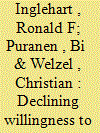| Srl | Item |
| 1 |
ID:
140076


|
|
|
|
|
| Summary/Abstract |
The Democratic Peace thesis suggests that the absence of war between major powers since 1945 is caused by the spread of democracy. The Capitalist Peace thesis emphasizes trade and the rise of knowledge economies as the forces driving peace. Complementing these interpretations, we present empirical evidence of a cultural change that is making peace more desirable to the publics of most societies around the world. Analyzing public opinion data covering 90% of the world’s population over three decades, we demonstrate that improving existential conditions elevate the life opportunities of growing population segments and lead them to become increasingly tolerant of diversity and place growing emphasis on self-realization. In recognition of life’s rising opportunities, people’s valuation of life changes profoundly: readiness to sacrifice one’s life gives way to an increasing insistence on living it, and living it the way one chooses. Hence, pro-choice values rise at the same time as willingness to sacrifice lives in war dwindles. Historical learning based on the specific experiences of given societies has also changed their publics’ willingness to fight in wars. This transformation of worldviews places interstate peace on an increasingly solid mass basis.
|
|
|
|
|
|
|
|
|
|
|
|
|
|
|
|
| 2 |
ID:
164403


|
|
|
|
|
| Summary/Abstract |
Is it joint democracy or state similarity that has a pacifying impact on interstate relations? This study explores the complementarity of the two propositions and demonstrates the potential of a particular kind of shared emancipative culture embracing values of autonomy, equality, choice, and voice to amplify the impact of joint democracy on interstate conflict. The data on cultural values, which comes from the World Values Survey, was integrated with the data from the Correlates of War Project to test the impact of joint democracy and cultural similarity on militarised interstate disputes (1981–2010). We find that culturally similar dyads are less likely to be involved in conflict with each other than culturally dissimilar dyads. Although, cultural similarity does not wash out the pacifying effect of democracy, it offers a complementary explanation to the democratic peace. We also find that states that are democratic and share higher than average scores on the emancipative values are less likely to engage in militarised interstate disputes than democratic states, which are culturally dissimilar or score low on the emancipative dimensions. This provides support for an additional normative/cultural impact on democratic peace.
|
|
|
|
|
|
|
|
|
|
|
|
|
|
|
|